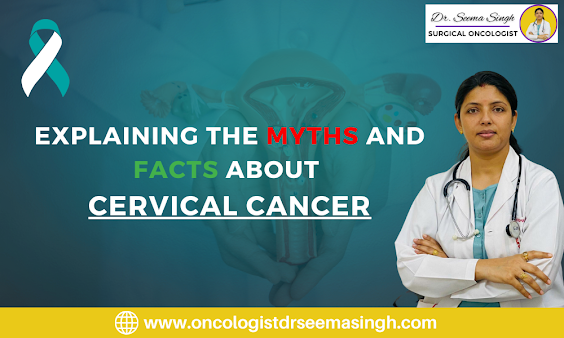Explaining the Myths and Facts about Cervical Cancer
It's a type of cancer that starts in the cervix, the lower part of the uterus. Most cases are caused by long-lasting infection with certain types of HPV, which is transmitted sexually. The cervix is especially prone to changes from HPV, so regular screenings and vaccinations are important for staying healthy.
HPV is a group of viruses spread through intimate skin-to-skin contact. Although most HPV infections go away on their own, persistent infections can raise the risk of cervical cancer. HPV vaccines target certain high-risk strains and greatly lower the chance of developing cervical cancer, marking a major breakthrough in preventive healthcare.
Dispelling Myths and Facts:
1. Myth 1: Only promiscuous individuals get HPV.Fact: HPV is very common and can affect anyone who is sexually active.
2. Myth 2: HPV always leads to cervical cancer.
Fact: Most HPV infections go away on their own, and only persistent infections increase the risk of cervical cancer.
3. Myth 3: HPV vaccines are only for teenagers.
Fact: While best given before sexual activity starts, HPV vaccines offer benefits even for sexually active individuals.
4. Myth 4: Pap smears prevent cervical cancer.
Fact: Pap smears detect early signs, but HPV vaccines are the main prevention.
5. Myth 5: Cervical cancer is not common.
Fact: It's one of the most common cancers in women worldwide.
6. Myth 6: Only women need to worry about HPV.
Fact: HPV can affect everyone, and vaccination is recommended for ages 9 to 65.
7. Myth 7: Cervical cancer has no symptoms.
Fact: Symptoms can include abnormal bleeding, pelvic pain, or unusual discharge.
8. Myth 8: Only individuals with multiple sexual partners get cervical cancer.
Fact: HPV can spread with even one sexual partner.
9. Myth 9: Condoms fully protect against HPV.
Fact: While condoms reduce the risk, they don't provide complete protection due to skin-to-skin transmission.
10. Myth 10: Cervical cancer is a death sentence.
Fact: Early detection and treatment greatly improve survival rates.
In conclusion, preventing cervical cancer is crucial. Regular screenings and HPV vaccines can greatly reduce the risk. Remember, anyone who is sexually active can get HPV, but vaccines and early detection can save lives. Don't forget, Dr. Seema Singh is the best surgical cancer doctor in Ghaziabad, ensuring top-notch care for those in need. Stay informed, stay healthy!

.png)
.png)

Comments
Post a Comment